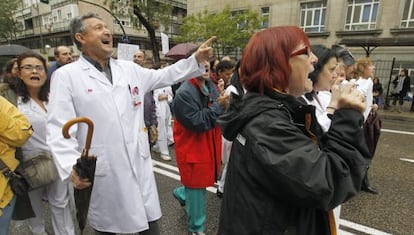Madrid backtracks on plans to “dismantle” Princesa hospital
Current services will be maintained, says regional government, despite additional emphasis on the over-75s


The Madrid regional government has performed an unexpected volte-face on its plans to reform the structure and function of La Princesa hospital in the capital. On October 31, regional Popular Party (PP) premier Ignacio González announced that the pioneering research hospital, which has stood for more than 150 years, would be turned into a specialist center for the treatment of over-75s.
However, after massive protests by staff and patients and a petition running to 200,000 signatures – that was signed by the mayor of Madrid, Ana Botella, also of the PP – representatives of the Madrid region’s health department met with the hospital workers’ committee on Monday and backtracked on its original scheme to take a scalpel to the center’s range of services. It was agreed that La Princesa will retain its current remit; treatment of adults of all ages, the maintenance of its catchment area of 300,000 people and the teaching and investigative character of the institution.
Further negotiations will be based around finding ways to “intensify the specific programs for patients of advanced age,” but in addition to the current roster of services the hospital offers, spokesman for the committee, Doctor Cecilio Santander.
Speaking a day after González’s announcement, regional health chief Javier Fernández-Lasquetty had explained that the hospital would be reserved for geriatric patients and although the emergency room would remain open, it would only admit people of that age range. Immediately, workers at the center, from management to the cleaning teams, staged sit-ins, daily demonstrations and started the petition against what the committee described as the “effective dismantling of the hospital.”
Also under González’s proposals, the administration of six recently built hospitals is to be tendered out to the private sector. Planned healthcare spending in the region for next year has been cut by seven percent to 7.108 billion euros, which makes up 45 percent of the budget for next year of 17.048 billion.
Labor unions accuse the regional government of constructing hospitals with public money, then allowing private companies to manage the business
La Princesa offers 40 specialist treatments to the more than a quarter of a million citizens within its catchment area. Medical professionals had feared for the disappearance of highly specialized services such as brain surgery, facial reconstruction surgery, and thoracic and cardiac treatments.
The plan, though, never had the appearance of being definitive. Fernández-Lasquetty declined to explain, for example, where the 270,000 patients under the age of 75 would be treated under González’s initial proposal. The plan even took the director of the hospital completely by surprise. The Spanish Medical Association, which roundly condemned the proposal, was not consulted beforehand, nor was any other professional organization. Labor unions described González’s plan as part of an “unprecedented privatization offensive against the Madrid public health system.”
The regional government’s change of heart has generated optimism, said Santander, but at a general assembly staged at the hospital on Monday many attendees championed maintaining protest until the about-turn was put in writing. “At the moment it’s all just words and people do not trust them,” said one worker who was present at the meeting between committee members, the deputy regional health chief Patricia Flores and the director general of hospitals, Antonio Burgueño, a former director of private medical insurance company Adeslas, who sources at the regional government say is behind the privatization plan for Madrid’s hospitals.
The regional health authority refused to confirm when asked by this newspaper on Monday that the emergency room and the 300,000 patients within La Princesa’s remit would be maintained. Sit-in protests are therefore scheduled to continue. “But now we can say that the hospital is not going to be closed or dismantled,” said Rosario García de Vicuña, from the Social Action Commission.
On November 1, La Princesa responded to the measures with a call for a staff sit-in, which began the next day, making the institution something of a standard bearer of the fight against the regional government's plans to privatize healthcare. Its staff, from departmental heads to the cleaning team, along with patients, have been among the first to mobilize, and were soon joined by those of hospitals around the region who have staged lock-ins, marches, and protest rallies over the last week. Labor unions and the opposition have accused the regional government of constructing and equipping hospitals with public money, then allowing private companies to manage them, even though these companies have not invested in them.
Tu suscripción se está usando en otro dispositivo
¿Quieres añadir otro usuario a tu suscripción?
Si continúas leyendo en este dispositivo, no se podrá leer en el otro.
FlechaTu suscripción se está usando en otro dispositivo y solo puedes acceder a EL PAÍS desde un dispositivo a la vez.
Si quieres compartir tu cuenta, cambia tu suscripción a la modalidad Premium, así podrás añadir otro usuario. Cada uno accederá con su propia cuenta de email, lo que os permitirá personalizar vuestra experiencia en EL PAÍS.
¿Tienes una suscripción de empresa? Accede aquí para contratar más cuentas.
En el caso de no saber quién está usando tu cuenta, te recomendamos cambiar tu contraseña aquí.
Si decides continuar compartiendo tu cuenta, este mensaje se mostrará en tu dispositivo y en el de la otra persona que está usando tu cuenta de forma indefinida, afectando a tu experiencia de lectura. Puedes consultar aquí los términos y condiciones de la suscripción digital.








































